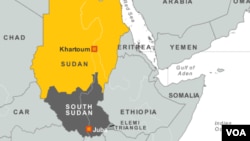JUBA —
Doctors in South Sudan have wrapped up a two-week campaign to perform reparative surgery on scores of women with obstetric fistula, a condition that causes incontinence and is linked to obstructed labor, a leading cause of maternal mortality.
The corrective operations were offered in three South Sudanese cities -- Wau, Kwajock and Juba. Eighty-six women turned up for operations at Juba Teaching Hospital, including Lilian Pita who underwent her fourth surgery for obstetric fistula.
Pita's operation was a success, and she urged other women to undergo the operation next time it is offered.
“I am now OK. I am happy because there is no urine in my bedding," she told VOA News.
"Before... I felt so sad and everyone would insult me. But now, I am fine. When I go home, the people who were insulting me will now be embarrassed,” she said.
Three women were brought from Yida refugee camp in Unity state, where tens of thousands of people who have fled fighting in South Kordofan and Blue Nile states in neighboring Sudan, for the operation. Two of the women underwent surgery, but the third, Neimat Said, was not so lucky.
"They said I should come back in February... I am very angry," she said.
"We will go back but how will I live? I don’t want to go back alone; if possible, I
should be left here until February,” she said.
One of the doctors performing the surgeries, Merghani Abdallah, said some women had to be turned away because of the massive turnout for the operation, and because some of the women need "special operations."
But, he said, "I have just been talking with the person responsible in the United Nations Populations Fund... and there may be another campaign in the beginning of the year."
Officials estimate that more than 60,000 South Sudanese women suffer from obstetric fistula, a preventable medical condition in which a hole develops between the birth canal and one or more of the woman's internal organs.
In the overwhelming majority of cases of obstetric fistula, the condition is caused by prolonged obstructed labor, which is also a leading cause of maternal mortality.
According to the Fistula Foundation, around five percent of all pregnant women worldwide experience obstructed labor, but in developed countries, where emergency obstetric care is available, obstetric fistulae have been almost entirely eliminated.
In developing countries like South Sudan, on the other hand, "where there are few hospitals, few doctors, and poor transportation systems, and where women are not highly valued, obstructed labor often results in death of the mother. When she survives, there is a great likelihood her child will die and she will develop a fistula," the foundation says.
The corrective operations were offered in three South Sudanese cities -- Wau, Kwajock and Juba. Eighty-six women turned up for operations at Juba Teaching Hospital, including Lilian Pita who underwent her fourth surgery for obstetric fistula.
Pita's operation was a success, and she urged other women to undergo the operation next time it is offered.
“I am now OK. I am happy because there is no urine in my bedding," she told VOA News.
"Before... I felt so sad and everyone would insult me. But now, I am fine. When I go home, the people who were insulting me will now be embarrassed,” she said.
Three women were brought from Yida refugee camp in Unity state, where tens of thousands of people who have fled fighting in South Kordofan and Blue Nile states in neighboring Sudan, for the operation. Two of the women underwent surgery, but the third, Neimat Said, was not so lucky.
"They said I should come back in February... I am very angry," she said.
"We will go back but how will I live? I don’t want to go back alone; if possible, I
should be left here until February,” she said.
One of the doctors performing the surgeries, Merghani Abdallah, said some women had to be turned away because of the massive turnout for the operation, and because some of the women need "special operations."
But, he said, "I have just been talking with the person responsible in the United Nations Populations Fund... and there may be another campaign in the beginning of the year."
Officials estimate that more than 60,000 South Sudanese women suffer from obstetric fistula, a preventable medical condition in which a hole develops between the birth canal and one or more of the woman's internal organs.
In the overwhelming majority of cases of obstetric fistula, the condition is caused by prolonged obstructed labor, which is also a leading cause of maternal mortality.
According to the Fistula Foundation, around five percent of all pregnant women worldwide experience obstructed labor, but in developed countries, where emergency obstetric care is available, obstetric fistulae have been almost entirely eliminated.
In developing countries like South Sudan, on the other hand, "where there are few hospitals, few doctors, and poor transportation systems, and where women are not highly valued, obstructed labor often results in death of the mother. When she survives, there is a great likelihood her child will die and she will develop a fistula," the foundation says.






